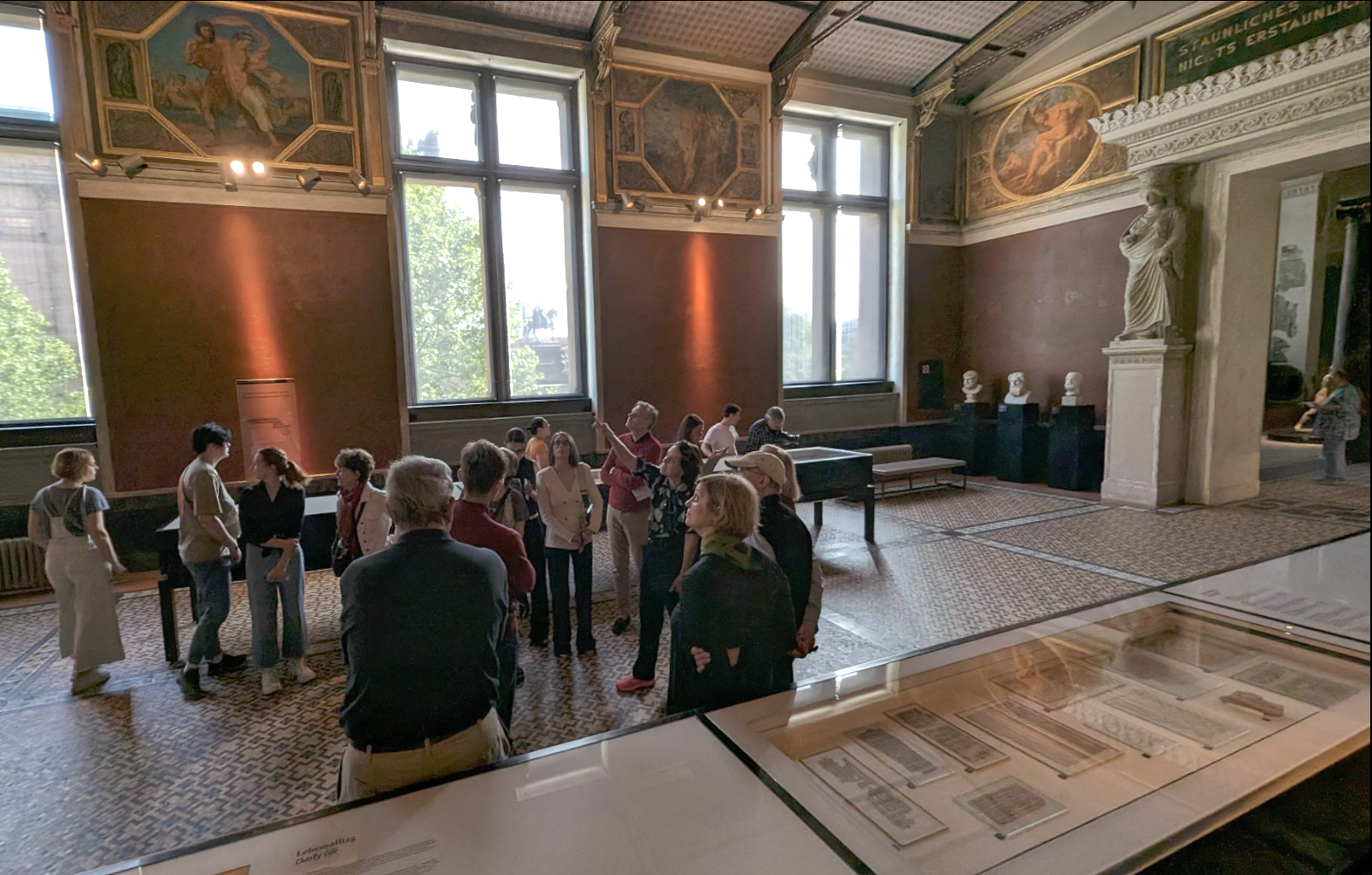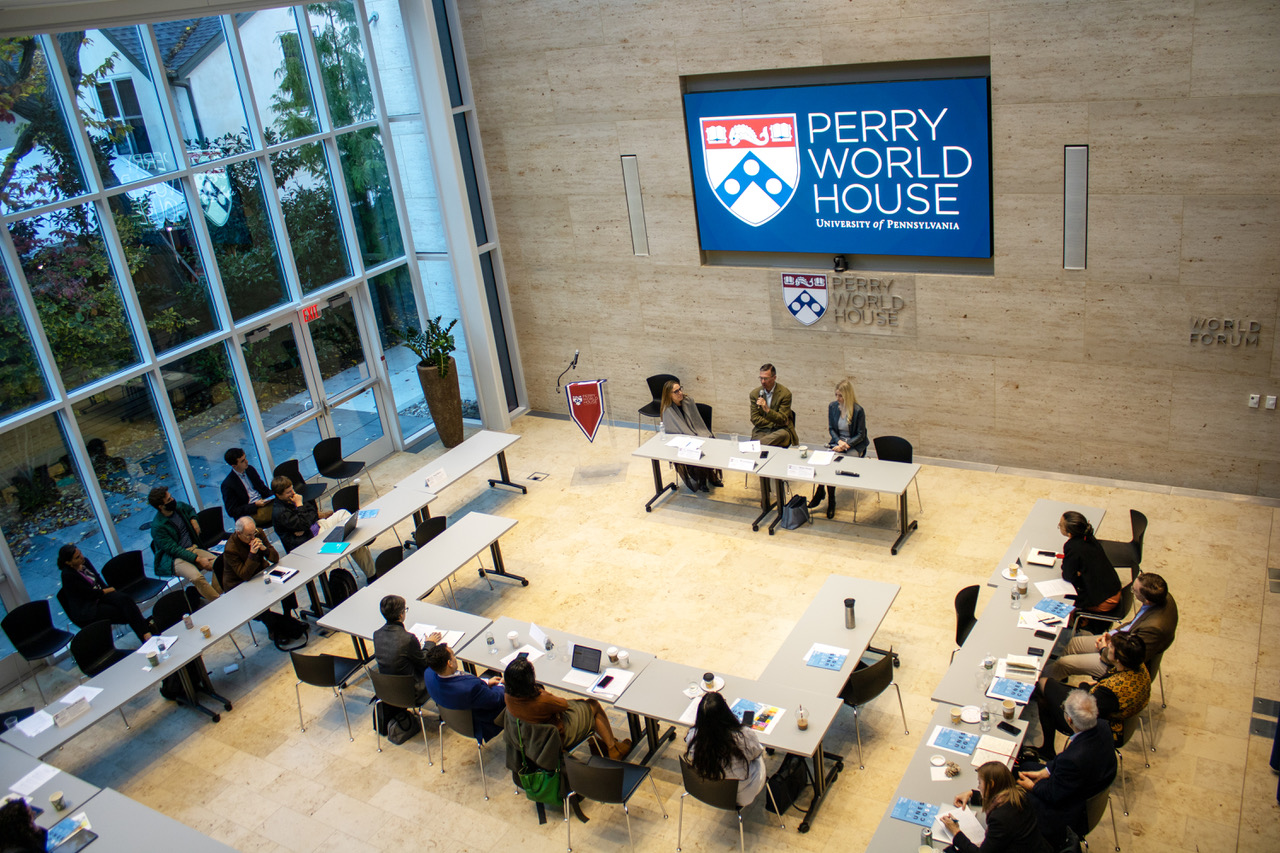PIK Professor Dr. Lynn Meskell, who among her appointments holds the position of Curator in the Asian and Near East Sections of the Penn Museum, recently organized a workshop on global cultural heritage at Perry World House. In the following, Meskell sets out the conference and its contribution.
This year marks the 50th anniversary of UNESCO’s 1972 World Heritage Convention, perhaps now more relevant than ever with the challenges of climate change, escalating conflict, and the need to address diverse communities’ rights and responsibilities. The international workshop adopted a multi-disciplinary approach to assessing these current crises and future risks, drawing upon political, legal and social contexts, in order to address the challenges to conservation and communities and to discuss possible ways forward. Workshop participants— scholars and practitioners who work all over the world, incorporating a variety of disciplines, methodologies and perspectives—discussed global heritage within the arena of broader concerns, including development, corporate ethics and political risk, and the convergence of climate change and Indigenous rights, as well as the more traditional domains of international law, diplomacy, and governance. We assembled a broad range of regional expertise, drawing from the Penn community and international scholars, focusing on the Middle East, Europe, Asia, Africa and the Americas. We also invited speakers from across the university, including from Arts and Sciences, Design, Wharton, Law and the Penn Museum.
The UNESCO World Heritage Convention was adopted in 1972, with the intension of protecting world cultural and natural heritage, linking the concepts of conservation and preservation of cultural properties. Ratification of the convention was complete in 1975, establishing the World Heritage Fund, which commenced to assist with the identification, preservation and promotion of World Heritage sites throughout the world. The representatives on all three panels in the workshop used this 50th anniversary as an opportunity to shed a light on the current state of the convention, as well as to offer insight on possibilities for its future. The workshop was an overwhelming success, with standing room only attendance at some points. It was attended by many Penn students, faculty, visiting scholars and staff, with additional attendance from people outside the Penn community.

The participants reflected on the current socio-political context of the 1972 Convention, as well as some of its significant achievements and notable trials throughout its turbulent history. The presenters considered the World Heritage milieu today, embedded as it is within a much broader landscape of NGOs and civil society preservation initiatives, as outlined by Jonathon Bell from World Monuments Fund. Like other UN agencies, UNESCO now faces challenges arising from various types of re-spatialization beyond the nation-state that further impact its effectiveness. This encompasses not only the expansive force of globalization, but also regionalization and localization, all of which have given rise to a new diplomacy. Speakers discussed the proliferation of international agencies and individual donors, then described the dilemmas facing World Heritage, including the rise of non-state actors and post-conflict remediation in the Middle East. Helen Frowe tackled this with her presentation on the ethical limitations of UN resolutions like Right to Protect (R2P) and combatants’ roles in preserving heritage in war zones. Trinidad Rico talked specifically about Islamic heritage and the persistence of Eurocentric preservation priorities in relation to heritage practices related to Islam. Speakers noted the limited recognition of Indigenous Peoples and their role in decision-making, and the persistent failures to remedy human rights violations, as discussed by Zeid Ra’ad Al Hussein, as well as international conflict since the Cold War, as noted by historian Paul Betts.
The last few decades have seen growing challenges within the World Heritage program, as outlined by presenters: namely, that the commitment to conservation goals has been replaced by the acquisitive practices of inscription, adding more and more sites to the World Heritage List, with less concern for the conservation of those already inscribed. The most obvious example is an upsurge in political pacting to overturn expert recommendations and de-value conservation goals, as noted by Michael Weisberg and Randy Mason. These practices are redolent of new forms of diplomacy, arising from the persistent problems that UNESCO itself has been unable to solve. As Nada al Hassan indicated in her opening remarks, members of the UNESCO Secretariat in Paris are also frustrated by the increasing politicization and the inability to hold states accountable, yet are unable to speak out publicly, much less censure nations. This older-style international diplomacy no longer has force, and such failures have only galvanized the perpetrators and predatory states, as well as the external actors hoping to rein them in. Meskell, Betts, Rico, Henisz and Frowe spoke to these matters specifically. However, none of this displaces the centralized decision-making power of the World Heritage Committee and the Member States; rather, it adds potential pressure and public attention to the limitations of conventional World Heritage governance and compliance.

The main workshop took place on October 27, 2022 in Perry World House (World Forum), with a break out round table session for a select group of scholars on the morning of October 28, 2022 in the Perry World House conference room. The day long workshop on the 27th was arranged with three panel sessions throughout the day, with a lunch at mid-day. The workshop began with introductions from PIK Professor Lynn Meskell and an opening statement from Penn Museum Director, Chris Woods. Woods stressed that the reevaluation of UNESCO was part of a broader cultural sea change in how society expects institutions engaged in heritage preservation to address larger political and societal issues. He also described the Museum’s role in this sea change, pointing out connections between the workshop’s evaluation of UNESCO’s practices and the Museum’s ongoing efforts to repatriate human remains and culturally sensitive objects to their descendants and communities of origin. Presentation videos from Nada Al Hassan, Advisor for Culture at UNESCO in Paris, and Zeid Ra’ad Al Hussein, Perry World House Professor of Law and Human Rights, set the tone for the day. La Shawn Jefferson, Perry World House Executive Director, addressed the audience to welcome them back after the mid-day lunch. The event was staffed by a university administrator and two student volunteers from the Weitzman School of Design.
The morning panel session was moderated by Richard Leventhal, Executive Director of the Penn Cultural Heritage Center and Professor of Anthropology. Presentations on the topic of Global Order were made by Paul Betts, Professor of Modern European History at St. Antony’s College, Oxford University; Trinidad Rico, Professor and Director of Heritage Conservation in the School of Architecture, University of Southern California; and Jonathan Bell, Vice President of Programs, World Monuments Fund.
The first afternoon panel was an open forum on Conservation and was moderated by Kecia Fong, Lecturer, Historic Preservation, Weitzman School of Design. Each of the panelists made a brief statement and then the discussion was opened up to the audience. Panelists for this session were Michael Weisberg, Professor and Chair of Philosophy and Senior Faculty Fellow and Director of Post-Graduate Programs, Perry World House; Frank Matero, Professor of Architecture and Director of the Graduate Program in Historic Preservation, Weitzman School of Design; Randy Mason, Professor of Historic Preservation, Weitzman School of Design and Faculty Director, Center for the Preservation of Civil Rights Sites; and Kim Bowes, Professor of Classical Studies.


The final panel of the day, World Heritage in Conflict, was moderated by Claudia Liuzza, Diplomacy Fellow at the Center for International & Global Studies, Duke University and Penn Cultural Heritage Center. Presentations on this topic were made by Helen Frowe, Professor of Practical Philosophy and Director of Stockholm Centre for the Ethics of War and Peace, Stockholm University, and Witold Henisz, Vice Dean and Faculty Director, ESG Initiative, and Professor of Management at the Wharton School.
A reception for speakers and a few invited guests was held directly after the workshop in the Mosaic Hall at the Penn Museum. Guests were invited to view the Heritage in our Hands exhibit to mark the 50th anniversary of the World Heritage Convention, curated by undergrad students interning at the Museum.
We'd love to hear from you. Share your feedback about Penn Museum Voices Blog: info@pennmuseum.org
Explore More


